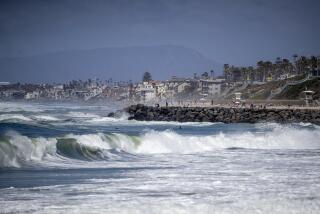New York City gets its own public-smoking ban. Who’s next?
- Share via
New York City is the latest city to make headlines by passing an outdoor smoking ban that would apply to parks and beaches. Other cities have enacted similar smoking bans in public places, but evidence may be scant as to whether they really clear the air.
The American Cancer Society reports on the dangers of secondhand smoke here. But when it comes to smoking outdoors, the organization says: “There is no research in the medical literature as yet that shows cigarette odors cause cancer in people.”
And the New York Times in an opinion piece earlier this month says the mayor and the city “have overreached” by prohibiting smoking in places like Times Square. It says: “No smoking at the crossroads of the world? The vortex of tourism that brings smokers and nonsmokers in great numbers? The site of the world’s most famous New Year’s Eve party, where who knows what goes on? All of this takes the mayor’s nannying too far, even for those of us who want to avoid the hazards of secondhand smoke.”
That’s not to say that secondhand smoke is benign. MedlinePlus sums up the dangers nicely: “Health effects of exposure to secondhand smoke include lung cancer, nasal sinus cancer, respiratory tract infections and heart disease. There is no safe amount of secondhand smoke. Children, pregnant women, older people and people with heart or breathing problems should be especially careful.”
The British Medical Journal published two opinion pieces on each side of the outdoor smoking ban in 2008. Professors from New Zealand wrote in support: “The central argument is that outdoor bans will reduce smoking being modelled to children as normal behaviour and thus cut the uptake of smoking. Outdoor smoke-free policies may in some circumstances (such as crowded locations like sports stadiums) reduce the health effects of secondhand smoke; will reduce fires and litter; and are likely to help smokers’ attempts at quitting.”
Simon Chapman, an Australian professor of public health, countered that science doesn’t support such bans. He wrote in part: “There are few differences between the chemistry of tobacco smoke and that generated by incomplete combustion of any biomass: leaves, campfires, petrol, or barbecued meat. Secondhand smoke is not so uniquely noxious that it justifies extraordinary controls of such stringency that zero tolerance outdoors is the only acceptable policy. Park barbecues aren’t banned for the obvious reason that the amount of smoke involved is trivial. Zero tolerance of tobacco smoke in outdoor public settings is nakedly paternalistic.”
Nakedly paternalistic, perhaps, but to people with asthma and “breathing problems,” what constitutes a “trivial” amount of smoke may be debatable. (Chapman does delve into that further in his paper.)
And we’re guessing this debate will continue -- in more places.
More to Read
Sign up for Essential California
The most important California stories and recommendations in your inbox every morning.
You may occasionally receive promotional content from the Los Angeles Times.











